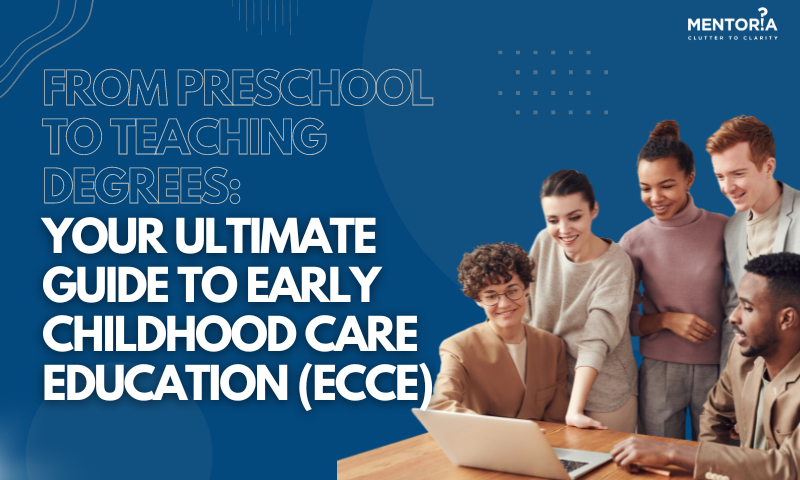From Preschool to Teaching Degrees: Your Ultimate Guide to Early Childhood Care Education (ECCE)

Welcome future educators! Are you passionate about helping children learn, grow and succeed? Early Childhood Care Education (ECCE) is the perfect starting point for those looking to make a positive impact on young minds. As a teacher in ECCE, you’ll be laying the foundation for a child’s lifelong learning journey, fostering their curiosity and creativity.
In this blog, we’ll explore the ins and outs of ECCE, including what it takes to become a teacher, the benefits of teaching at this level, and how you can make a difference in the lives of young children. So, let’s dive in and discover the wonderful world of ECCE together!
Understanding the Importance of Early Childhood Care Education (ECCE)
As an aspiring teacher, it’s crucial to understand the significance of this field. ECCE lays the foundation for a child’s future development, and it’s the first step towards academic success.
Research suggests that the first few years of a child’s life are critical for brain development, and ECCE plays a vital role in nurturing this growth. Through play-based learning, children learn essential life skills, develop social and emotional intelligence, and gain cognitive abilities.
Moreover, ECCE fosters creativity and curiosity in children, which helps them become lifelong learners. By providing a safe and stimulating environment, ECCE can help children develop a positive attitude towards learning and set them up for success in their academic and personal lives.
As a teacher, you have the power to shape young minds and help children reach their full potential. By investing in ECCE, you’re investing in the future of our society. So let’s get excited about ECCE and make a difference!
How To Pursue ECCE as a Teaching Career
Here are some steps you can take to become an ECCE teacher:
Build Your Foundation
Building a strong foundation in ECCE involves developing a passion for working with children, staying up-to-date with the latest research and trends, and having a strong understanding of child development. The first step is to gain a solid foundation in early childhood development. Start by exploring different theories of child development and learning styles. You can find many fun and interactive online resources to learn more about these topics.
Gain Practical Experience
To understand the day-to-day aspects of an ECCE teacher’s job, you can start by volunteering at a local daycare or preschool. This will give you hands-on experience in working with children and help you understand what it takes to be a successful ECCE teacher. This practical experience allows you to apply the knowledge you’ve learned in the classroom and develop your skills.
Pursue Formal Education
While not always required, pursuing formal education can help you stand out in the job market. It also helps you to develop the skills and knowledge needed to succeed in this rewarding career. Many colleges and universities offer degree programs in ECCE, which cover topics such as curriculum development, child psychology, and teaching methodologies.
Obtain ECCE Certification
Obtaining an ECCE certification can provide you with a competitive edge in the job market. It demonstrates your dedication and knowledge of the field, making you a valuable asset to any employer. Many states and countries require ECCE teachers to be certified. Check with your local education department to see what certification is required in your area.
Network and Join Associations
Joining an ECCE association is a great way to meet other professionals in the field, learn about new trends and ideas. Joining professional associations and networking with other ECCE teachers can help you stay up-to-date with the latest teaching trends and best practices. These associations also offer networking opportunities that can lead to job opportunities and career growth.
Exploring ECCE Curriculum and Teaching Methods
Are you ready to dive into the world of early childhood care education (ECCE) and explore the different curriculum and teaching methods? Well, get ready because we’re about to embark on a fun and interactive journey!
First things first, let’s talk about what the ECCE curriculum actually means. Essentially, it’s a set of guidelines that outlines what children should learn and how they should learn it during their early years. This typically includes things like language and literacy, maths, science, and social-emotional development.
Now, when it comes to teaching methods, there are many different approaches that teachers can take to help children learn and grow. Some of the most popular ones include play-based learning, project-based learning, and Montessori-style education. Each approach has its own unique strengths and benefits, so it’s important for teachers to consider what will work best for their students.
One of the most exciting things about the ECCE curriculum and teaching methods is that they can be incredibly creative and interactive! For example, teachers might use games, songs, and other fun activities to help children learn maths concepts or improve their language skills. And with technology becoming more prevalent in classrooms, teachers can also use digital tools like educational apps and interactive whiteboards to engage students in new and exciting ways.
So, there you have it – a brief but exciting overview of the ECCE curriculum and teaching methods. Whether you’re an aspiring teacher or just interested in learning more about early childhood education, there’s never been a better time to explore this fascinating field.
Navigating Challenges in ECCE: Tips for Success
If you’re reading this, you’re probably interested in becoming an early childhood care education (ECCE) teacher or already working in the field. Let’s face it – working with young children is not always a walk in the park. There will be challenges and obstacles to overcome, but fear not! Here are some tips for navigating those challenges and achieving success in ECCE.
Embrace Flexibility
Young children are unpredictable and ever-changing, so it’s important to be adaptable and flexible. Be prepared to switch gears and adjust your plans as needed to meet the needs of your students. Every day brings new challenges and opportunities for learning. Be willing to adjust your plans, activities, and teaching styles to meet the needs of each child and the group as a whole. Embracing flexibility will help you create a dynamic and engaging learning environment.
Patience is Key
Patience is a virtue when it comes to working with young children. You must have the ability to remain calm and patient, even in challenging situations. It takes time and practice to develop patience, but it’s essential for creating a positive and supportive learning environment. Children learn at their own pace, and it’s important to have patience as they develop new skills and knowledge. Remember to celebrate the small victories along the way!
Communication is Crucial
Communication with parents, co-workers, and children is essential in ECCE. Be sure to keep everyone informed about what’s going on in the classroom, and be open to feedback and suggestions. You must be able to communicate effectively with both children and parents. Communication helps build trust, create positive relationships, and ensure that everyone is on the same page. Always be clear, concise, and compassionate when communicating.
Creativity is your Friend
Young children learn best through play and exploration, so get creative with your teaching methods. This means coming up with unique and interesting solutions that will catch their attention. Use props, music, and hands-on activities to engage your students and make learning fun. So don’t be afraid to think outside the box!
Remember, working in ECCE can be challenging, but it’s also incredibly rewarding. By embracing flexibility, patience, communication, creativity, organisation, and self-care, you can navigate those challenges and be a successful ECCE teacher. Keep up the great work, educators!
Get #CareerReady with Mentoria
As you can see, Early Childhood Care Education (ECCE) plays a crucial role in shaping the future of our society by nurturing young minds and preparing them for the world ahead. By becoming an ECCE teacher, you have the opportunity to make a positive impact on the lives of children and their families, and contribute to the overall well-being of society.
So if you have a passion for working with young children and want to make a meaningful difference in the world, then ECCE is the perfect career choice for you. With the right training and qualifications, you can embark on a fulfilling journey as an ECCE teacher and help create a brighter future for generations to come.
We’re here to provide you with all the help! Kick-start your career discovery journey with Mentoria and discover the right career fit for you. Feel free to call us to speak to our career mentors and choose the right career guidance plan that suits your needs.
Mentoria’s career guidance programme enables you to choose your perfect fit from 3 streams, 850+ courses, and 12,000+ careers, and discover what will bring out the best in you.









